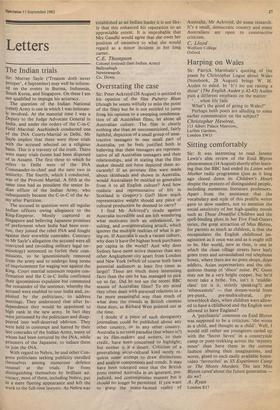Letters
The Indian trials
Sir: Murray Sayle (`Treason doth never Prosper', 4 September) may well be inform- ed on the events in Burma, Indonesia, South Korea, and Singapore. On these I am not qualified to impugn his accuracy.
The question of the Indian National (rebel) Army is one in which I was intimate- ly involved. At the material time I was a Deputy to the Judge Advocate General in India, and under the orders of the C-in-C Field 'Marshal; Auchinleck conducted one of the INA Courts-Martial in Delhi. Mr Sayle implies that there were three trials with the accused selected on a religious basis. This is a travesty of the truth. There were many trials (some had been disposed of in Assam). The first three to which he refers in Delhi were of the INA Commander-in-chief and the next two in seniority. The fourth, which I conducted, was of the Provost Martial. A fifth at the same time had as president the senior In- dian officer of the Indian Army, who subsequently became the C-in-C of the Ar- my after Partition.
The accused in question were all regular Indian officers owing allegiance to the King-Emperor. Mostly captured at Singapore and believing Japanese promises of preferment when India had been over- run, they joined the rebel INA and fought against their erstwhile comrades. Contrary to Mr Sayle's allegation the accused were all convicted and (avoiding military legal ter- minology) sentenced to forfeit their com- missions, to be ignominiously removed from the army and to undergo long terms of imprisonment for waging war against the King. Court martial sentences require con- firmation and the C-in-C India confirmed their ignominious expulsion but commuted the remainder of the sentence, whereby the accused were enabled to tour India and, ex- ploited by the politicians, to address meetings. They understood that after In- dependence they would be appointed to high rank in the new army. In fact they were jettisoned by the politicians and disap- peared into well-deserved oblivion. They were held in contempt and hatred by their late comrades of the Indian Army, many of whom had been tortured by the INA, while prisoners of the Japanese, to induce them to join the INA.
With regard to Nehru, he and other Con- gress politicians seeking publicity enrolled themselves among numerous defence counsel at the trials. Far from distinguishing themselves by brilliant ad- vocacy, most of them, including Nehru, put in a mere fleeting appearance and left the work to the full-time lawyers. As Nehru was established as an Indian leader it is not like- ly that this enhanced his reputation to an appreciable extent. It is improbable that Mrs Gandhi would agree that she owes her position of eminence to what she would regard as a minor incident in her long career.
C.E. Thompson
Colonel (retired) (late Indian Army) Ball ysallagh Newtownards Co. Down


































 Previous page
Previous page